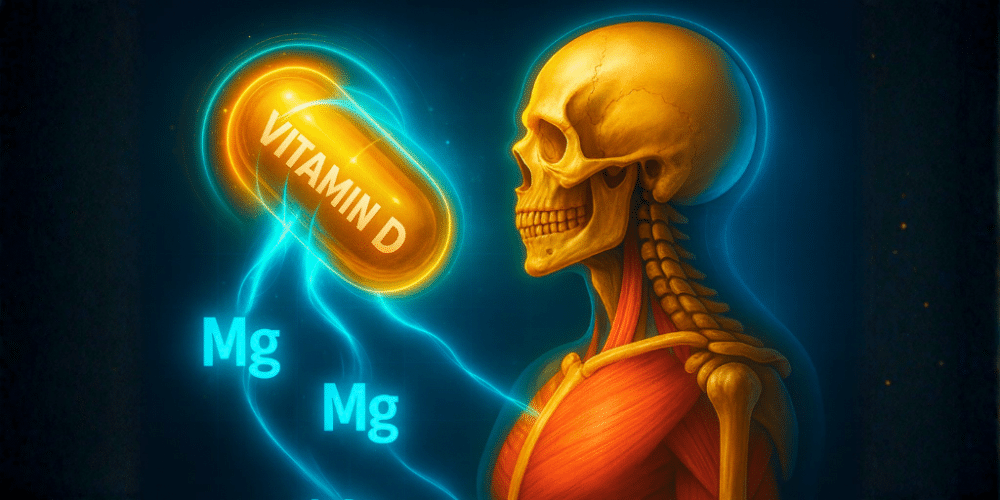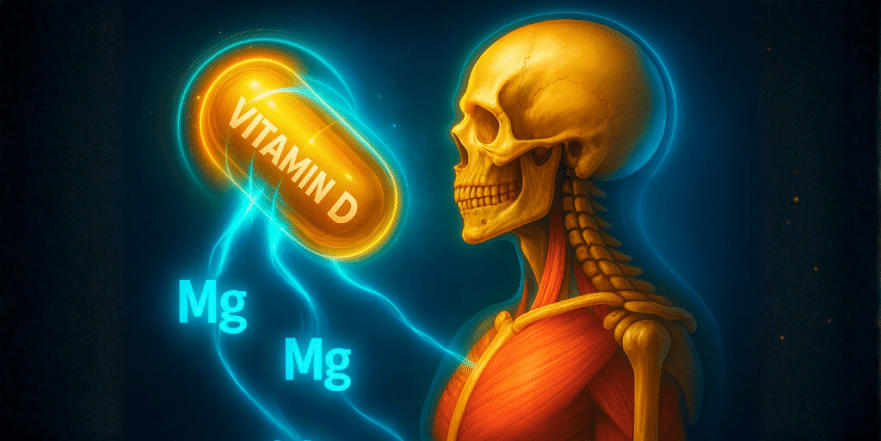
Did you know that some of the very supplements you take to improve your health could be quietly draining one of your body’s most critical minerals? It’s a frustrating paradox. You’re trying to do the right thing for your body, but you end up feeling fatigued, anxious, or dealing with muscle cramps. If this sounds familiar, you might be experiencing the downstream effects of a magnesium deficiency, potentially made worse by your supplement routine.
Magnesium is one of the most important electrolytes in your entire body. Think of it as the ultimate relaxation mineral. You need it for over 300 enzymatic reactions, including energy production, muscle movement, nervous system regulation, heart rhythm, and fluid balance. It’s a master mineral that helps keep other electrolytes in check. The problem is, a huge portion of the population is already walking around with insufficient magnesium levels due to modern diets low in whole foods, chronic stress, and, as we’re about to discuss, high doses of certain supplements. This article will walk you through the key supplements that can deplete your magnesium stores, so you can make informed choices and keep your body in balance. (Based on the insights of Felix Harder)
Key Takeaways
- Many common supplements, while beneficial for some things, can either directly deplete your magnesium or significantly increase your body’s demand for it.
- Vitamin D is a major culprit, as your body cannot activate it without using up magnesium. It also increases calcium absorption, which further competes with magnesium.
- Calcium and sodium are direct magnesium antagonists. When their levels are high, they can push magnesium out of your cells and cause your kidneys to excrete more of it.
- Supplements that boost energy and metabolism, like creatine, B vitamins, and iodine, increase your body’s need for magnesium to fuel these accelerated processes.
- If you take any of these supplements, it’s crucial to also supplement with magnesium to avoid deficiency symptoms like fatigue, anxiety, muscle cramps, and poor sleep.
1. Vitamin D: The Classic Magnesium Drainer
This one might be the most surprising for many people. Vitamin D is essential for immune function, bone health, and mood, and supplementing with it is incredibly common, especially for those in less sunny climates. But here’s the thing that most people don’t realize: your body can’t actually use the vitamin D you ingest without magnesium. The activation process is entirely dependent on it.
When you take a vitamin D supplement, it first travels to your liver, where it’s converted into a storage form called calcidiol. Then, it moves to your kidneys to be turned into the final, active hormone form, calcitriol. Both of these critical conversion steps are driven by enzymes that require magnesium as a mandatory co-factor. If you don’t have enough magnesium, these enzymes slow down. To compensate, your body will pull magnesium from your muscles and bones to get the job done, effectively draining your reserves. The more vitamin D you take, the more pressure you put on this pathway and the more magnesium your body burns through to keep up.
But that’s not all. Vitamin D creates a double whammy for your magnesium levels because it also significantly boosts calcium absorption from your gut. As we’ll discuss next, calcium and magnesium are in a constant balancing act. When calcium levels go up, magnesium levels tend to go down. So, you end up with a two-pronged problem: you’re using up more magnesium to activate the vitamin D, and you’re also absorbing more calcium, which pushes your magnesium levels down even further. The result? You might start experiencing classic low-magnesium symptoms like insomnia, anxiety, heart palpitations, muscle twitching, or fatigue—ironically, some of the very issues you might have been trying to fix with vitamin D in the first place. The key takeaway here is simple: always take magnesium with your vitamin D.
2. Calcium and Sodium: The Direct Antagonists
I’m grouping these two minerals together because they both act as direct antagonists to magnesium, meaning they compete with it for absorption and function within the body. Most people in the Western world consume far too much calcium and sodium and not nearly enough magnesium and potassium.
Let’s start with calcium. You know calcium is vital for strong bones, but its relationship with magnesium is a delicate dance of opposition. Your muscles need calcium to contract and magnesium to relax. If calcium levels get too high relative to magnesium, it can overstimulate your muscle cells and nervous system, leading to cramps, tightness, and a feeling of being on edge. On a cellular level, calcium primarily resides outside your cells, while magnesium is found mostly inside. This electrical gradient is crucial for proper nerve and muscle function. When you supplement with high doses of calcium without enough magnesium to counter it, you disrupt this delicate balance. Excess calcium can push magnesium out of your cells and interfere with how your body utilizes it, leading to a functional deficiency even if your intake seems adequate.
Next up is sodium, which is often overlooked as a magnesium antagonist. This is a big deal, especially if you consume a lot of processed foods, use electrolyte drinks, or add a lot of salt to your meals. Like calcium, the more sodium you ingest, the more magnesium you need to balance it. They also have an inverse relationship in the kidneys; when your sodium levels are high, your kidneys respond by excreting more magnesium in your urine. So, if you’re taking salt tablets for exercise, chugging sports drinks, or just have a high-sodium diet, your body is likely losing precious magnesium every time you use the restroom. This effect is made even worse by stress. When you’re stressed, your adrenal glands release a hormone called aldosterone, which tells your kidneys to hold onto sodium and dump both potassium and magnesium. This creates an electrical imbalance where the excitatory minerals (sodium and calcium) dominate the calming minerals (magnesium and potassium), leading to symptoms like high blood pressure, water retention, anxiety, and fatigue.
3. Creatine: The Indirect Energy Drain
You probably wouldn’t connect creatine, a popular supplement for muscle growth and performance, with magnesium. Creatine doesn’t directly deplete magnesium in the same way that calcium does, but it dramatically increases your body’s demand for it.
Here’s how it works: Creatine’s primary function is to boost the production of ATP (adenosine triphosphate), which is your body’s main energy currency. But here’s the crucial piece of the puzzle: ATP is biologically useless on its own. In order to be active and usable by your cells, ATP must be bound to a magnesium ion. In fact, nearly all ATP in your body exists as a complex called Mg-ATP. Without magnesium, your cells can’t access the energy stored in ATP.
So, when you take creatine, you’re increasing your body’s pool of ATP. To make all that new ATP stable and active, your body needs a corresponding amount of magnesium. You are essentially increasing your magnesium requirement every time you supplement with creatine. On top of this, people who take creatine are typically engaging in intense exercise—lifting heavy weights, sprinting, or doing high-intensity interval training. This type of activity itself uses up a lot of magnesium, which is lost through sweat and urine. Intense training is also a physical stressor on the body, which, as we’ve learned, further depletes magnesium. So, while creatine isn’t a direct depleter, its use almost guarantees you need more magnesium, especially if you’re training hard. Supplementing with magnesium can make a huge difference in how well your creatine works and how quickly you recover.
4. Metabolism Boosters: High-Dose B Vitamins & Iodine
Finally, let’s talk about supplements that are designed to ramp up your metabolism and energy production, like high-dose B-complex vitamins and iodine. These don’t directly attack your magnesium levels, but they do crank up your body’s internal engine, and magnesium is the fuel that keeps that engine from overheating.
Magnesium is involved in nearly every part of cellular energy production. When you take something that stimulates your metabolism, you’re stepping on the gas pedal, and your body’s demand for magnesium skyrockets. B vitamins—particularly B1, B2, B3, and B6—act as essential coenzymes in the mitochondria, the powerhouses of your cells where energy is made. Almost all of the mitochondrial reactions that these B vitamins facilitate also require magnesium to function properly. So, the more you increase your B vitamin intake, especially in high supplemental doses, the more your body draws on its magnesium reserves to keep the metabolic gears turning.
The same principle applies to iodine. Iodine is crucial for supporting your thyroid gland, which acts as the master controller of your metabolic speed. When you take iodine and your thyroid hormone production increases, your entire system runs faster. Your heart rate, digestion, detoxification pathways, and energy output all accelerate. While this can feel great, every single one of those processes costs magnesium. If you don’t increase your magnesium intake along with your iodine, you can end up feeling wired but tired, anxious, twitchy, or even completely burned out. Anything that boosts your energy levels is going to boost your magnesium demand, and you must consciously make up for that deficit.
A Final Word on Magnesium
The big takeaway is that many popular and beneficial supplements directly or indirectly use up your magnesium stores. Since most of us are already starting with a low supply, this can quickly lead to deficiency. While you should absolutely aim to eat magnesium-rich foods like dark leafy greens, pumpkin seeds, almonds, and avocados, it’s often difficult to meet your needs through diet alone, especially if you’re active or taking the supplements we’ve discussed. This is why most people can benefit from a good magnesium supplement. A good starting dose is between 200-400 mg per day, taken in the evening. If you’re taking high doses of vitamin D or calcium, you will likely need more. And don’t forget to manage your stress, as chronic stress will deplete your magnesium faster than almost anything. By being mindful of this master mineral, you can ensure your supplement routine is truly supporting your health, not unintentionally undermining it.
Source: Felix Harder

